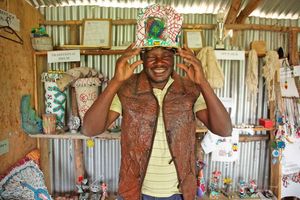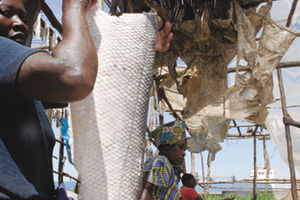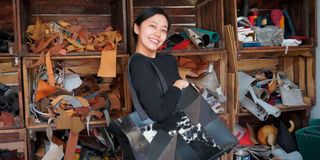
Cindy Kwak, founder of Nashipai Leather, in Kabati Murang'a County, in this photo taken on January 18, 2025. The venture specialises in handcrafted leather products.
From the rugged landscapes where livestock graze to the bustling tanneries and artisan workshops, Kenya is on the cusp of a leather renaissance. The country's leather industry has experienced significant growth in recent years, driven by a rising demand for high-quality leather products.
Among the key players in this expanding market is the leather footwear sector, which remains the largest sub-sector.
However, the handbag segment is rapidly gaining traction, as consumers increasingly seek stylish, durable, and eco-friendly options. Local ventures are stepping up to meet these demands while embracing sustainability, with Nashipai Leather emerging as a standout in the industry.
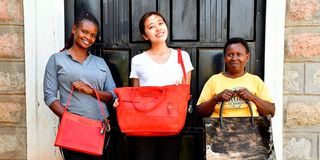
Cindy Kwak (centre) with her assistants Everlyne Awino (right) and Mary Muthoni display some of the hand woven leather products they make at Nashipai Leather as pictured on February 11, 2023.
Founded by Kenya-raised, Korea-born Cindy Kwak, Nashipai Leather is a brand deeply rooted in social impact and sustainability. Cindy’s upbringing in Kenya, coupled with her exposure to the resilience and beauty of the Maasai culture as well as the deaf community, inspired her to create a brand that honours these traditions while empowering marginalised groups.
“My background is rooted in the missionary work my family has done in Kenya. Through this experience, I embraced the beauty of the Maasai culture and developed a strong commitment to working with vulnerable communities, particularly the deaf,” she explains.
This foundation shaped the mission of Nashipai Leather: to create high-quality products while promoting social and environmental responsibility.
High-quality
Nashipai Leather specialises in handcrafted leather products, focusing primarily on premium leather bags. Recognising a gap in the market for high-quality, sustainable and ethically produced goods, the company set out to address this need.
Unlike many luxury brands, Nashipai seamlessly integrates sustainability, social impact, and exceptional craftsmanship.
Cindy launched the company using personal savings and initial funding from supporters passionate about sustainable fashion, an amount totaling Sh5 million.
The brand has since gained external support, including a training course from Generation Kenya in partnership with the Swedish Embassy, which has helped scale operations and expand its reach.
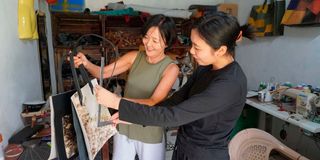
Cindy Kwak is the founder of Nashipai Leather, in Kabati Murang'a County, a venture that specialises in handcrafted leather products, focusing primarily on premium leather bags in this photo taken on January 18, 2025.
Additionally, the International Trade Centre (ITC)’s development program has provided crucial guidance in shaping the company’s direction and building a sustainable business system.
All our products are made using a traditional hand-stitching technique known as saddle stitching, with no machines involved. This approach ensures the durability of our leather goods,” she notes.
The brand sources leather that is a by-product of the meat industry, minimising waste and ensuring sustainable practices. The company strives to minimise waste in every step of production.
Leather scraps that are often discarded in traditional manufacturing processes are repurposed to create accessories, such as unique trinkets, all reinforcing the brand’s commitment to a zero-waste philosophy.
Establishing Nashipai Leather came with its share of challenges. Securing funding, finding skilled artisans, and building a sustainable supply chain were significant hurdles.
“However, perseverance, strategic partnerships, and commitment to quality helped the brand overcome these obstacles. Through dedication and collaboration, we have successfully positioned ourselves within the ethical fashion space," she says.
A cornerstone of the brand’s mission is empowering individuals with disabilities, particularly deaf women, by creating economic opportunities for marginalised groups. This initiative provides employment and promotes a sense of community and empowerment.
Beyond financial independence, artisans gain confidence, develop creative skills, and receive greater recognition within their communities. Currently, Nashipai Leather employs a team of seven female artisans.
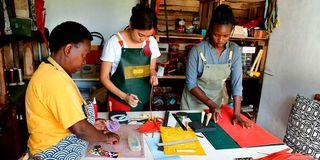
Cindy Kwak (centre) with her assistants Mary Muthoni (right) and Everlyne Awino at work at the Nashipai Leather workshop in Kabati, Murang'a County on February 11, 2023.
Cindy’s commitment to this cause dates back 16 years when she helped establish a center in Dandora that provided a safe space for children from diverse backgrounds, including deaf girls.
Valuable skills
As these girls transitioned into adulthood, she saw an opportunity to equip them with valuable skills for financial independence. Today, the initiative provides hands-on training in leather craftsmanship, enabling individuals with disabilities to earn a livelihood while contributing to the brand’s growth.
“The production process, though slow and labour-intensive, reflects the "slow fashion" ethos of prioritising quality and environmentally conscious methods. It starts with sourcing high-quality leather, followed by cutting, hand-stitching, and assembling by skilled artisans,” she says.
The finished pieces undergo rigorous quality checks to ensure durability and aesthetic appeal. To reduce waste, leftover leather scraps are repurposed into new designs.
Due to their handcrafted nature, Nashipai’s leather goods are priced at a premium. The brand offers a range of products, including handbags, wallets, and accessories, with handbags priced between Sh10,000 and Sh30,000.
Despite the higher price point, these products are well-received by customers seeking luxury items that align with social and environmental values. The products are available at select stores across Nairobi, including Lana Plaza in Kileleshwa and high-end establishments like the Fairmont The Norfolk and JW Marriott.
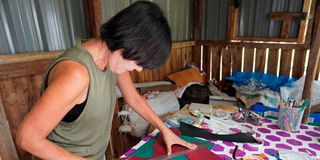
Donghee Kang, the creative designer at Nashipai Leather, carefully measures and sketches innovative ideas to bring new leather products to life in this photo taken on January 18, 2025, in Kabati, Murang'a County.
In addition to empowering artisans, Cindy's long-term vision for Nashipai includes expanding its reach and providing more training and employment opportunities for individuals with disabilities.
The company has partnered with organisations like Nita, Generation Kenya, and the Swedish Embassy to offer training in leather crafting and sewing machine operation, helping to create pathways for marginalised individuals to join the workforce.
Nashipai Leather has ambitious plans for the future, including the introduction of new product lines to diversify its offerings and meet growing consumer demands. While the brand currently specialises in premium leather bags, it aims to expand its product range to include a broader selection of accessories.
“We hope to reach a wider market, including those seeking eco-friendly and ethically produced leather goods for various aspects of their lives. This expansion will allow us to cater to a broader audience while creating more job opportunities, particularly for artisans with disabilities, as we grow and scale our operations,” she says.
For Cindy, the true measure of success lies in the lives her business touches.
“Our success story will be the people we work with. As long as we can continue empowering and providing opportunities for those who need them most, we will consider ourselves successful,” she concludes.

